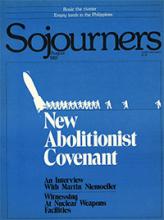The Christian faith must be demonstrated anew in each historical moment. The gospel is always addressed to the time in which we live. Christians must find ways to relate timeless but timely faith to their own situation, showing what they will embrace and what they will refuse because of Jesus Christ.
Some historical issues stand out as particularly urgent among the church's fundamental concerns. These overarching moral questions intrude upon the routine of the church's life and plead for the compassion and courage of God's people everywhere. Slavery was such a question for Christians in the 19th century. The nuclear arms race is such a question today.
Thousands of Christians from diverse traditions came to see that slavery was an evil that challenged the very integrity of their faith. They believed that for any person to claim ownership of another human being denied that each person is loved by God and made in God's image. These Christians began to preach that to follow Christ meant to turn away from the institution of slavery, to refuse to cooperate with it, and to work for its abolition. Though this seemed like an absurd, unattainable goal, they insisted that God required nothing less. They came to be called abolitionists.
Christian acceptance of nuclear weapons has brought us also to a crisis of faith. The nuclear threat is not just a political issue any more than slavery was: It is a question that challenges our worship of God and our commitment to Jesus Christ. In other words, the growing prospect of nuclear war presents us with more than a test of survival; it confronts us with a test of faith.
Nuclear war is total war. Unlimited in their violence, indiscriminate in their victims, uncontrollable in their devastation, nuclear weapons have brought humanity to a historical crossroads. More than at any previous time in history, the alternatives are peace or destruction. In nuclear war there are no winners.
Read the Full Article

